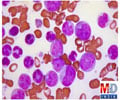Blood stem cells develop genetic mutations that can end in adult leukemia and the key reason for this has been discovered by scientists in a study.

The study, led by UCSF team, opens a new frontier for studying the molecular underpinnings of adult leukemia.
The discovery also suggests a possible therapeutic strategy, the scientists say, for reducing the risk of leukemia that results from chemotherapy used to treat solid tumors.
Finally, it may explain why other types of adult stem cells are susceptible to accumulating potentially lethal mutations.
In the study, conducted in the culture dish and mice, the team set out to determine if blood stem cells in the quiescent state were at greater risk for incurring genetic mutations in the process of repairing damaged DNA than were proliferating cells.
The team determined that both quiescent and proliferating blood stem cells have protective mechanisms ensuring their survival in response to exposure to ionizing irradiation, as occurs from such sources as the sun and X-rays.
Advertisement
"The thinking has been that blood stem cells must proliferate to acquire the mutations that drive tumor development. This work says, 'not so,'" Passegue added.
Advertisement
"Existing drugs, such as G-CSF and prostaglandins, could be used to induce hematopoetic stem cells to proliferate prior to the use of therapy with DNA damaging agents. This could enhance DNA repair fidelity and reduce the risk of leukemia development," Passegue said.
The study was published in the journal Cell Stem Cell.
Source-ANI















